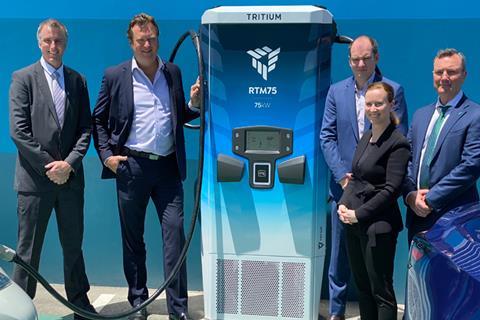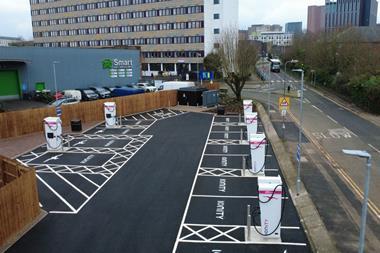
Electric vehicle (EV) charger company Tritium has unveiled what it claims is the first platform to enable scalable EV charging networks anywhere in the world, with the launch of its MSC hardware platform.
The MSC (Modular Scalable Charging) hardware platform provides customers with the flexibility to increase the power level of their charger as EV charging capabilities advance, and “pay as you grow”. Charger power can be increased in 25kW increments, starting at 25kW and increasing to 350kW and beyond.
“This has been something the industry and our customers have asked for over the years, and we are the first company in the world to deliver it,” said Jane Hunter, CEO of Tritium. “With our MSC platform, 50kW DC chargers can quickly be upgraded to 75kW, 100kW, and beyond, without a rip-and-replace required.”
“This solution is future-proofing governments and network operators across the globe, something they have been crying out for. No longer is a charger just a charger; instead, it’s a first step to meet the needs of both today’s and tomorrow’s electric vehicles.”
As part of the launch, the company also revealed the first charger built on the platform with the unveiling of its next-gen RTM75 DC Fast Charger, which is says will allow drivers to add 46 miles of range to an electric vehicle in 10 minutes of charging. The slim charger also allows for simultaneous charging of two vehicles at once and is designed for urban, retail, fleet and public environments.
Hunter commented: “We listened to the industry, our customers and to governments across the globe, and the RTM75 is the result of those conversations.
“These chargers can be installed quickly, scale as required, and are suitable to be installed anywhere; from shopping centre carparks, to urban environments, and at service stations.”
According to Tritium he RTM75 supports all charging standards on the market, including CCS and CHAdeMO, and satisfies the needs of all batteries up to 920V.
The RTM75 is also equipped with Plug and Charge (ISO 15118) technology, eliminating credit card payments or RFID authentication at the charger. Instead customers can pay through the charging cable when it communicates to the car directly. A driver simply plugs in their EV, charges their car, and drives away knowing that payment was automatically and securely managed via a set of digital authentication certificates that contain pre-approved payment and configurations.



























No comments yet